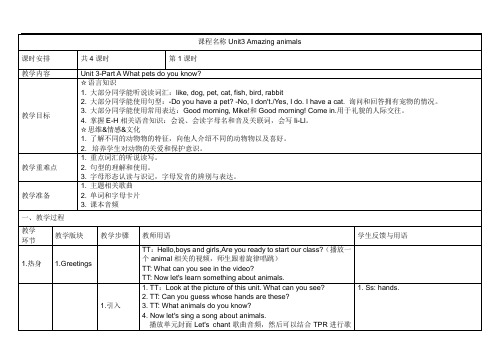Unit 3 What can you see
- 格式:ppt
- 大小:8.15 MB
- 文档页数:37


Comprehending1 What was Wang Kun and Wang Wei’s idea of a good trip?Their idea was to take a long bike trip.2 Who planned the trip to the Mekong?Wang Wei planned the trip.3 Where is the source of the Mekong and which sea does it enter?The source of the river is in Qinhai Province and it enters the South China Sea.4 What can you see when you travel along the Mekong?You can see the source glacier, rapids, hills, valleys, waterfalls and plains. 5What difficulties did Wang Kun and Wang Wei find about their journey?The journey will begin at an altitude of more than 5,000 metres, where it is hard to breathe and very cold.6 What do you think about Wang Kun and Wang Wei?Wang Kun’s character: enthusiastic, critical, sensibleWang Wei’s character: imaginative, organized, eager, persistent, stubborn, risk-takingown words.1 She gave me a determined look – the kind that said that she would notchange her mind.She gave me a determined look …This sentence means that she has decided to do something and will not change her ideas.2… my sister does not care about details.… details are not important to my sister. This means that she concentrates on the broad outline of the trip but not the particulars: where they will stay, what they will take with them, etc.3It makes wide bends or meanders through low valleys to the plains where rice grows.A meander is a geographical term to describe the snakelike bends that a river makes as it slows down to flow through valleys to the plains. The sentence means that the Mekong River flows slowly and gently through the valleys and reaches the farming plains.attitude is what a person thinks about something. Write down Wang Wei’s and Wang Kun’s attitude to the trip. Then add your own opinion. Wang Wei’s attitude Positive to the trip. She wants to organise it as it was heridea.Wang Kun’s attitude Less positive to the trip as he wants to organise it andthinks he can do that better than his sister.My attitude It sounds like a wonderful trip and I would love to be ableto do a trip like that myself one day.a paragraph from the passage and use the information to help you make up a dialogue.W ANG WEI: You know, we’ve always wanted to do a long bike trip. Whydon’t we go on one after we graduate form college?W ANG KUN: That’s a good idea. ...Sample dialogue:W ANG WEI: You know, we’ve always wanted to do a long bike trip. Why don’t we go on one after we graduate form college?W ANG KUN: That’s a good idea. But where are we going?W ANG WEI: What about cycling along the Mekong River?W ANG KUN: It sounds interesting, but how do you want to plan it?W ANG WEI: I think we should do it properly. We must find the source of the river and start from there.W ANG KUN: Well, the Mekong River begins in Qinghai Province. That means we’re going to be cycling at an altitude of more than 5,000 metres. W ANG WEI: Oh, I think that’s exciting, don’t you?W ANG KUN: Remember that the air will be hard to breathe and it’ll be very cold.W ANG WEI: That’s going to meke it an interesting experience.W ANG KUN: I wish you weren’t so stubborn. You don’t know where it is but you still insist that you know better than anyone else. Now I know that the proper way is always your way, but have you looked at a map yet?W ANG WEI: No, I haven’t. that’s just a detail!W ANG KUN: OK. I can see by your determined look that you won’tchange your mind.meaning.EXAMPLE: We were both surprised to learn that half the river is in China.→Not only my sister, but also I was surprised ot learn that.We were both surprised to learn that half the river is in China.→(means we did n’t know this)We were both surprised to learn that half the river is in China.→(means we thought that may be more than half was in China)We were both surprised to learn that half the river is in China.→(means that we didn’t know that half the river is in China)Learning about languageDiscovering useful words and expressionsFind the correct words or expressions from the text for each sentence.1 He is so stubborn that no one can persuade him to do anything.2 A determined person always tries to finish the job, no matter how hard it is.3 My grandpa is fond of fishing and sometimes he fishes all day in the river.4 Liu Xiaoding is a good teacher and cares about his students very much.5 I prefer the red dress to the green one because it fits me better.6The concert went like clockwork because Li Pei had organized it so well.7 I wanted to pay the train fare, but my friend insisted. Finally I gave in.8 She persuaded all of us to cycle to work instead of taking the bus.1 As neither of them would give in, no decision was taken that day.(give in / give up)2 I liked the first flat we saw better because it was larger. (like ... better / prefer ... to)3 The task was difficult, but Helen’s determined expression let me know that she would not give up. (stubborn / determined)4 The list of gifts was very long, and we don’t know why, but the most important item, the golden cup, was forgotten. (detail / item)5“How I wish I could make a journey into space and see the stars up close!” cried Sarah. (journey / travel)6When he returned from his successful climb of Mount Qomolongma, Andrew finished his travel journal and gave it to the newspaper. (journal / diary)7 She had only one shortcoming: she was very stubborn. (disadvantage / shortcoming)8The very first time that Joe saw the film “ET”directed by StevenSpielberg, he made up his mind to become a director too.(make up one’s mind / change one’s mind)rapids glacier mountain delta plain valley waterfall bank I really enjoyed my school field trip in geography two months ago. We saw so many beautiful things: a glacier that flowed like a river of ice through a valley that cut the mountains into two parts. We also discovered a river that was falling off the mountain and became a wonderful waterfall. This was even more exciting to see than the rapids where the water seemed to boil. Later we followed the river to a quieter plain and finally into a delta and the sea.Discovering useful structuresLook at the questions in the Warming up again. They are in the present continuous tense but they express future actions. Can you find similar sentences from the reading passage?When are you leaving? Where are you staying?How are you going to ... ? How long are you staying in ... ? When are you arriving in/at ... ? When are you coming back?1 Where are we going?2 When are we leaving and when are we coming back?Wei about her plans for the trip along the Mekong River. However, they are not sure about some of the verb tenses. Please complete their conversation.R: Miss Wang, I hear that you are travelling (travel) along the Mekong River. Have you got everything ready?W: Almost.R: So when are you leaving (leave) ?W: Next Monday.R: How far are you cycling (cycle) each day?W: It’s hard to say. If the weather is fine, I think we’ll be able to ride 75 km a day.R: What about the weather in Qinghai Province?W: The weather forecast is not good so we are taking (take) a large parcel of warm clothes with us.R: Where are you staying (stay) at night?W: Usually in our tent, but sometimes in the villages along the river bank. R: What happens if you have an accident?W: Don’t worry. I had some medical training at my college. Besides, we are taking (take) out insurance to cover any problems.R: Well, it sounds fun. I hope you’ll have a pleasant journey. Thank you for your time.You have got some plans for the future. Use the present continuoustense to express your future actions. Give as much information as you can.EXAMPLE: (this evening) I’m going out this evening. /I’m not doing anything this evening. / I don’t know what I’m doing this evening.1 (tomorrow morning)2 (the day after tomorrow)3 (next Saturday evening)4 (next month)Using LanguageReading and discussing1 What items are Wang Kun and Wang Wei carrying with them? What do you think they will have to leave behind in Dali? What should they take instead?Wang Kun and Wang Wei are carrying a tent, a cooker and food, pillows, water bottles. In the mountains they wore long wool coats, caps, gloves and trousers. In the plains they changed into T-shirts and shorts.2How does Wang Kun feel about the trip now? What do you think changed his mind?He is starting to like / enjoy it. Seeing how beautiful the land is has changed Wang Kun’s attitude.Wang Wei. What do you think they would say before they leave camp? Sample dialogue:WK: Oh, up so early?WW: Early? It’s nearly 9 o’clock!WK: Oops. (Looks at his watch). I guess you’re right.WW: Why were you so tired?WK: Well, I stayed up late last night to watch the stars.WW: That’s nice. They must be pretty.WK: Yes, they were.Listen to the tape and mark the rising and falling tone of each sense group and sentences from “To climb the mountains ...” to “... T-shirts and shorts”. Then practise reading it aloud.To climb the mountains was hard work but as we looked around us, we were surprised by the view. We seemed to be able to see for miles. At one point we were so high that we found ourselves cycling throgh clouds. Then we began going down the hills. It was great fun especially as it gradually became much warmer. In the valleys colourful butterflies flew around us and we saw many yaks and sheep eating green grass. At this point we had to change our caps, coats, gloves and trousers for T-shirts and shorts.To climb the mountains was hard↘work∣but as we looked↗around us, we were surprised by the view. || We seemed to be able to see for ↘miles. || At one ↗point we were so ↘high ∣that we found ourselves cycling throgh ↘clouds. || Then we began going down the ↘hills. || It was great ↘fun especially as it gradually became much↘warmer. || In the valleys ∣colourful butterflies flew ↗around us ∣and we saw many yaks and sheep eating green ↘grass. || At this ↗point ∣we had to change our ↗caps, ↗coats, gloves and trousers for T-shirts and ↘shorts.Listening and speakinglistening is about.dialogue.LISTENING TEXTJOURNEY DOWN THE MEKONGPart 3 CHATTING WITH A GIRLThe next day the travellers see a girl (G) walking along the road. Wang Kun (WK) speaks to her.WK: Hello!G: Hello! Are you travellers?WK: Yes. We’re travelling along the Mekong River. We’ve been allthrough China and now we’re going to follow the river through Laos. G: I’m Laotian. The Mekong’s our most important river. Did you know that it appears on our national flag?WK: Really?G: Yes. We use the river for washing, fishing and transporting things around the country. We’d be lost without it. It’s better than a road.WK: Well, no wonder I’ve seen boats going up and down –they’er transporting goods and people.G: Yeah. We call it “the sea of Laos” although we’re not near the sea. It’s because the water is sa useful to us sa the sea.WK: How interesting! In Tibet the river’s called “the water of the rocks”. Both names tell us a lot about the river, don’t they?G: Yes, they do. Watch out for the temples, caves and a waterfall along the river.WK: Wow! Can we sleep by the river?G: Yes, of course you can. There are many small villages along the river. You can stay there if you wish.WK: Thanks a lot.1 A girl from Laos told Wang Kun about how Laotians use the Mekong River.2A girl told Wang Kun about what they would see along the Mekong River.3 A girl from Laos told Wang kun about how important and beautiful the Mekong is.A( ) B( ) C( √)A is only partly correct because the girl also mentions the Laotian name for the Mekong River and how the Laotians use it.B is only partly correct because other information about the importance of the river and its Laotian name was also mentioned.The Mekong is the most important river in Laos. It even appears on the national flag of the country. Laotian people use the river for washing, fishing and transporting goods and people around the country. They call the Mekong “the sea of Laos”, but it Tibet people call it “the water of the rocks”. If you follow the river in Laos, you can visit temples, caves and a waterfall. At night, you can sleep in some small villages by the river.into pairs and continue the dialogue between them. Use the following expressions to end your conversation.Have a nice/good time. Have a nice/good trip. Take care.Have fun. Good luck on your journey. Write to me.Say hello to ... give my love/best wishes to ... best wishes. Sample dialogue:WK: What’s the food like in Laos?G: It’s delicious. There are many fish dishes and a special fish soup. The fisher-men catch the fish and then cook it. You should try that.WK: I love to try new food. What will we see along the riverbank?G: Well there are thick forests and mountains in the north of Laos and many interesting plants, birds and animals in the south of Laos. It’s so beautiful by the river that the scenery will take your breath away.WK: That sounds wonderful. I cannot wait to get going. Thank you for telling us so many things. Take care.G: Have a nice time on your journey. Keep in touch and write to me of you have time. Goodbye.WK: I will. Goodbye.WritingImagine that you are a friend of Wang Kun. Write a short email asking about Laos.·In pairs brainstorm some questions.EXAMPLE:What is the food like in Laos? What do you think of the country? ·Choose two or three questions and use each sa a new paragraph.How was your trip?What did you do when ...?Have you met ...?When did you get back?What kind of things did you see?Could you give me more details about ...?Could you tell me about ...?Sample writing:My dear brave Wang Kun,How are you these days? I keep wondering how you feel about your trip. Are you enjoying it? I hope that you are. Are you in Cambodia yet? When you get to Phnom Penh, tell me about the Buddhist temples there. When are you coming back? I am so looking forward to hearing about all your adventures. Please send some photos with your next letter! Well, have fun and don’t forget to write to me!Say “Hello” to Wang Wei for me.Good luck on your journey.Take care!Your friend forever,Hu Lin。
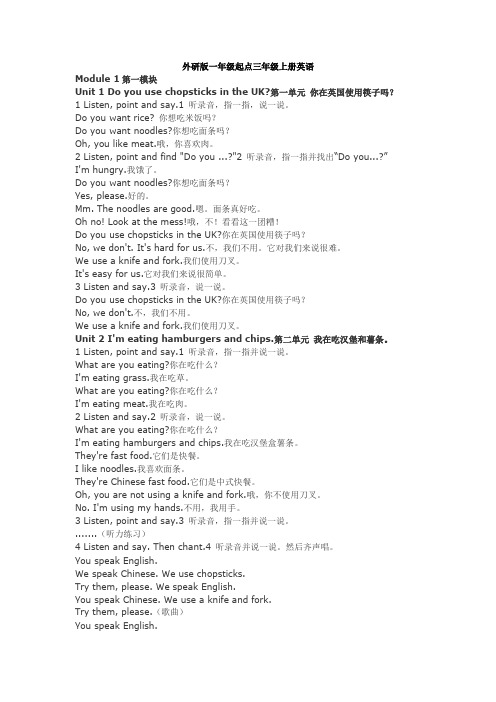
外研版一年级起点三年级上册英语Module 1第一模块Unit 1 Do you use chopsticks in the UK?第一单元你在英国使用筷子吗?1 Listen, point and say.1 听录音,指一指,说一说。
Do you want rice? 你想吃米饭吗?Do you want noodles?你想吃面条吗?Oh, you like meat.哦,你喜欢肉。
2 Listen, point and find "Do you ...?"2 听录音,指一指并找出“Do you...?”I'm hungry.我饿了。
Do you want noodles?你想吃面条吗?Yes, please.好的。
Mm. The noodles are good.嗯。
面条真好吃。
Oh no! Look at the mess!哦,不!看看这一团糟!Do you use chopsticks in the UK?你在英国使用筷子吗?No, we don't. It's hard for us.不,我们不用。
它对我们来说很难。
We use a knife and fork.我们使用刀叉。
It's easy for us.它对我们来说很简单。
3 Listen and say.3 听录音,说一说。
Do you use chopsticks in the UK?你在英国使用筷子吗?No, we don't.不,我们不用。
We use a knife and fork.我们使用刀叉。
Unit 2 I'm eating hamburgers and chips.第二单元我在吃汉堡和薯条。
1 Listen, point and say.1 听录音,指一指并说一说。
What are you eating?你在吃什么?I'm eating grass.我在吃草。


冀教版五年级英语上册Unit 3 综合素质达标时间: 40分钟满分: 100分听力(30分)笔试(70分)总分题号一二三四五六七八九十十一得分第一部分听力(30分)一、听录音, 选出你所听句子中包含的单词。
(5分)()1. A. come B. live C. travel()2. A. old B. young C. beautiful()3. A. speak B. say C. talk()4. A. slow B. snow C. know()5. A. Saturday B. Sunday C. Friday二、听录音, 选出与所听内容相符的图片。
(5分)()1. A. B. C.()2. A. B. C.()3. A. B. C.()4. A. B. C.()5. A. B. C.三、听对话, 根据对话内容选择正确答案。
(10分)()1. Where does Jenny want to go?A. To Beijing.B. To Shanghai.C. To London.()2. How far is it from Linda’s home to the supermarket?A. It’s 2 kilometres.B. It’s 5 kilometres.C. It’s 3 kilometres.()3. What does Lily want to buy?A. Some vegetables.B. Some books.C. Some juice.()4. How will they go to the restaurant?A. By bus.B. By bike.C. On foot.()5. Who will go to Beijing with Li Ming?A. His parents.B. His mother and sister.C. His father and sister.四、听短文, 根据短文内容选择正确答案。

Unit 3 What can you see?
一、过关单词:
river河流lake湖boat小船cloud云
sky天空mountain山;山脉moon月亮sun太阳star星星town城镇map地图near在……附近
二、过关句型:
1.What can you see?你能看见什么?
2.I can see a river.我能看见一条河流。
3.I can see a lake and a boat.我能看见一个湖和一只小船。
4.I can see the blue sky.我能看见蓝天。
5.I can see white clouds.我能看见白云。
6.It’s nice.它很漂亮。
7.The town is beautiful.这个城镇很美。
三、过关知识点:
1.掌握can表示能力。
can后面接动词原型,如:read, write, jump。
I can read.(他能阅读。
)
can“t = can not(不能) I can sw im./I can“t swim.(我会游泳。
/我不会游泳。
)2.sun, moon是专有名词,前面要加the。
表示太阳,月亮时,为the sun, the moon。
1/ 1。

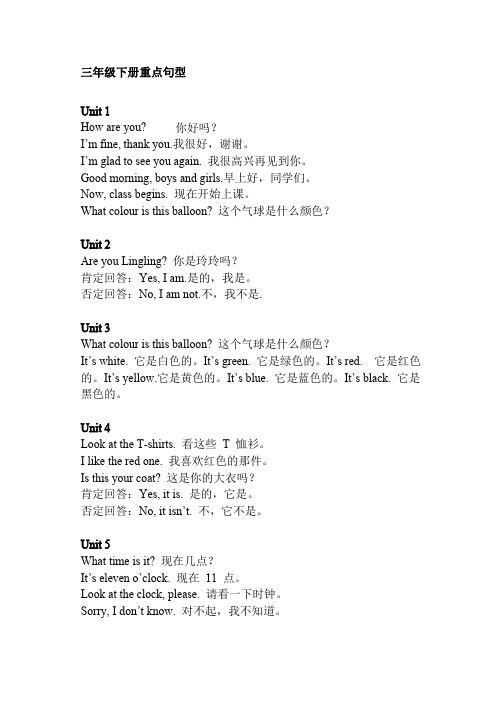
三年级下册重点句型Unit1How are you?你好吗?I’m fine,thank you.我很好,谢谢。
I’m glad to see you again.我很高兴再见到你。
Good morning,boys and girls.早上好,同学们。
Now,class begins.现在开始上课。
What colour is this balloon?这个气球是什么颜色?Unit2Are you Lingling?你是玲玲吗?肯定回答:Yes,I am.是的,我是。
否定回答:No,I am not.不,我不是.Unit3What colour is this balloon?这个气球是什么颜色?It’s white.它是白色的。
It’s green.它是绿色的。
It’s red.它是红色的。
It’s yellow.它是黄色的。
It’s blue.它是蓝色的。
It’s black.它是黑色的。
Unit4Look at the T-shirts.看这些T恤衫。
I like the red one.我喜欢红色的那件。
Is this your coat?这是你的大衣吗?肯定回答:Yes,it is.是的,它是。
否定回答:No,it isn’t.不,它不是。
Unit5What time is it?现在几点?It’s eleven o’clock.现在11点。
Look at the clock,please.请看一下时钟。
Sorry,I don’t know.对不起,我不知道。
Unit6How many rulers are there?那里有多少支尺子?Thirteen rulers.13支尺子。
How many pens are there?那里有多少支钢笔?Fifteen pens.15支钢笔。
Unit7Is this an orange?这是一个橘子吗?肯定回答:Yes,it is.是的,它是。


Unit 2 What can you see? 【单元目标导学】【教材知识详解】一、课文情景描述1.英语描述:What can you see?2.汉语描述:你能看见什么?二、教材词汇全解(二)词汇1.fly 飞fly的基本意思是“飞”“飞行”,指鸟、昆虫或飞行器在空中飞翔或航行。
例句:The plane is flying from Beijing to London.这架飞机正从北京飞往伦敦。
2.koala考拉用作名词例句:She has not seen a koala.她没见过考拉。
3.climb 爬climb的基本意思是“攀登,向上爬”,是指步行或用手脚(也可借助工具)向上攀登,也可指日月的上升。
例句:Can you climb the hill?你能爬上这座山吗?4.cry 哭cry的基本意思是“哭”,指流泪哭着公开表示悲哀、痛苦或难过等感情,强调发出声音,有时也表示无声地流泪,是日常用语,多用于口语中。
例句:What's that boy crying about?那个男孩儿在哭什么?四、课文句型讲解1. What can you see? 你能看见什么?句式是:特殊疑问词+can+主语+动词原形+其它。
例句:What can you see in the picture?你能在图画中看到什么?2. It can fly. 它能飞。
肯定句型为:主语+can+动词原形+其它。
例句:They can play basketball.他们能打篮球。
【相关话题拓展】情态动词用法情态动词无人称和数的变化;不能单独使用,必须与其后的动词原形构成谓语。
1. 表示能力(体力、知识、技能)。
Can you lift this heavy box?(体力)Mary can speak three languages.(知识)Can you skate?(技能)此时可用be able to代替。
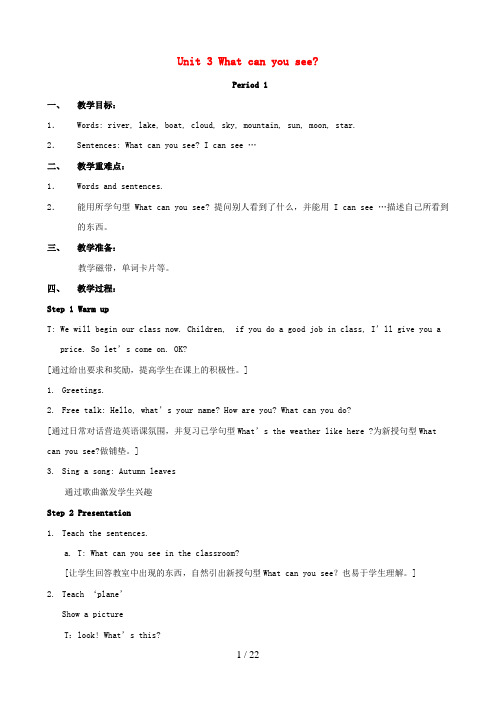
Unit 3 What can you see?Period 1一、教学目标:1.Words: river, lake, boat, cloud, sky, mountain, sun, moon, star.2.Sentences: What can you see? I can see …二、教学重难点:1.Words and sentences.2.能用所学句型What can you see? 提问别人看到了什么,并能用I can see …描述自己所看到的东西。
三、教学准备:教学磁带,单词卡片等。
四、教学过程:Step 1 Warm upT: We will begin our class now. Children, if you do a good job in class, I’ll give you a price. So let’s come on. OK?[通过给出要求和奖励,提高学生在课上的积极性。
]1.Greetings.2.Free talk: Hello, what’s your name? How are you? What can you do?[通过日常对话营造英语课氛围,并复习已学句型What’s the weather like here ?为新授句型What can you see?做铺垫。
]3.Sing a song: Autumn leaves通过歌曲激发学生兴趣Step 2 Presentation1.Teach the sentences.a. T: What can you see in the classroom?[让学生回答教室中出现的东西,自然引出新授句型What can you see?也易于学生理解。
]2.Teach ‘plane’Show a pictureT:look! What’s this?S:(提示学生)plane通过开火车等小游戏巩固单词3.Teach ‘boat’Show a pictureT: Look, here’s a picture. What can you see in the sky? (plane, kite) What can you see in the river? (duck, boat)[把单词和句型结合在一起操练学习,并为新单词的引出做了铺垫。
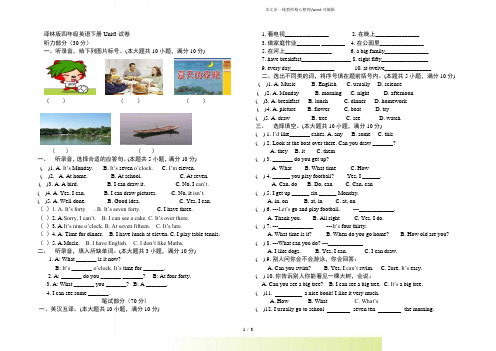
译林版四年级英语下册Unit3试卷听力部分(30分)一、听录音,给下列图片标号。
(本大题共10小题,满分10分)()()()()()一、听录音,选择合适的应答句。
(本题共5小题,满分10分) ( )1. A. It’s Monday. B. It’s seven o’clock. C. I’m eleven.( )2. A. At home. B. At school. C. At seven.( )3. A. A bird. B. I can draw it. C. No, I can’t.( )4. A. Yes, I can. B. I can draw pictures. C. No, it isn’t.( )5. A. Well done. B. Good idea. C. Yes, I can.()1. A. It’s forty . B. It’s seven forty. C. I have three.()2. A. S orry, I can’t. B. I can see a cake. C. It’s over there.()3. A. I t’s nine o’clock. B. At seven fifteen. C. It’s late.()4. A. Time for dinner. B. I have lunch at eleven. C. I play table tennis.()5. A. M usic. B. I have English. C. I don’t like Maths.二、听录音,填入所缺单词。
(本大题共3小题,满分10分)1. A: What _______ is it now?B: It’s _______ o’clock.It’s time for _______.2. A: _______ do you _______ _______? B: At four forty.3. A: What _______ you _______? B: A _______.4. I can see some _______.笔试部分(70分)一、英汉互译。
